“The world needs new social poets so as not to rob children of their future”
The Holy Father received in audience the participants in the first Plenary Assembly of the Dicastery for Culture and Education
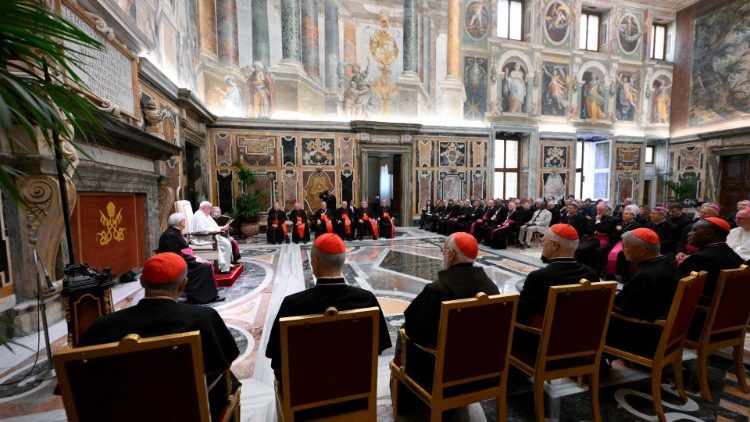
“I urge you to understand your mission in the educational and cultural field as a call to broaden your horizons, to overflow with inner vitality, to give rise to unprecedented possibilities, to offer ways of giving that only expand when shared,” with these words Pope Francis encouraged the participants in the first Plenary Assembly of the Dicastery for Culture and Education, whom he received in audience on the morning of Thursday, November 21, in the Clementine Hall of the Vatican.
Two fruitful and overflowing areas
To the members of this Vatican Dicastery who are holding their Plenary Assembly for the first time, the Holy Father in his speech reiterated the importance of the risk of putting together this binomial: culture and education.
“When, with the Apostolic Constitution Praedicate Evangelium, I decided to unite the two organs of the Holy See that deal with education and culture, I was not so much motivated by the search for economic rationalization, but rather by a vision of the possibilities of dialogue, synergy, and innovation that can make these two areas even more fruitful, I would say overflowing.”
The world needs new social poets
In this sense, Pope Francis pointed out that the world needs new interpreters of the resources that human beings carry within themselves, new social poets. In fact, said the Pope, there is no need for educational models that are mere “factories of results,” without a cultural project that allows us to form people capable of helping the world turn a new page, eradicating inequality, endemic poverty and exclusion.
“The pathologies of today’s world are not a fatality that we must accept passively, and much less comfortably. Schools, universities, cultural centers must teach us to desire, to thirst, to dream, because, as the Second Letter of Peter reminds us, ‘we await new heavens and a new earth, in which righteousness dwells’ (3:13).”
The basic criterion for discernment and conversion
Quoting a poem by Emily Dickinson, the Bishop of Rome invites the members of this Dicastery to make the “quality of expectations” the basic criterion for discernment and conversion of our cultural and educational practices.
“The key question for our institutions is this: What are we really hoping for? Perhaps the honest answer will be disappointing: success in the eyes of the world, the honor of being in the rankings, or self-preservation. Of course, if that were the case, it would be too little!”
Do not let fear overwhelm us
For all this, the Holy Father encourages them not to have any reason to let fear overwhelm us. First, because Christ is our guide and traveling companion. Secondly, because we are the custodians of a cultural and educational heritage greater than ourselves, which goes from St. Augustine, Ephrem the Syrian, Thomas Aquinas, Edith Stein, Blessed Angelico, Mozart, Mark Rothko, Olivier Messiaen and Blaise Pascal.
“In a word, we are heirs to the educational and cultural passion of so many Saints.”
Let us free ourselves from every weight of pessimism
And it is precisely to the world of culture and education that Pope Francis entrusts the promotion of hope, especially as we approach the beginning of the Holy Year of 2025, so that this cry of hope can be extended.
“Let us free ourselves from every weight of pessimism: pessimism is not Christian. Let us converge, with all our strength, to free the human being from the shadow of nihilism, which is perhaps the most dangerous plague of today’s culture, because it seeks to erase hope. And let us not forget: hope does not disappoint, it is strength. That image of the anchor: hope does not disappoint.”
It is cultural genocide when we steal the future from children
Keeping in mind that today the world has the largest number of students in history, however, says the Pope, sad disparities between students persist, as well as a strong school dropout rate that needs to be changed.
“It is a moral imperative to change this situation. Because cultural genocides do not occur only because of the destruction of a heritage; brothers and sisters, it is cultural genocide when we steal the future from children, when we do not offer them the conditions to become what they could be. When we see children in many places going through the garbage to look for things to sell so they can eat, we think of the future of humanity with these children.”
Studying the benefits and dangers of AI
In the face of the scientific acceleration that is affecting the cultural world with the development of Artificial Intelligence, Pope Francis hopes that university research centers will study this “revolution” to highlight “the advantages and the dangers.” And he concludes by repeating:
“We must not let the feeling of fear win. Remember that complex cultural transitions often prove to be the most fruitful and creative for the development of human thought. Contemplating the living Christ allows us to have the courage to launch ourselves into the future, trusting in the word of the Lord who calls us: Let us go to the other shore. Please do not be a retired educator: the educator always advances, always.”
Related
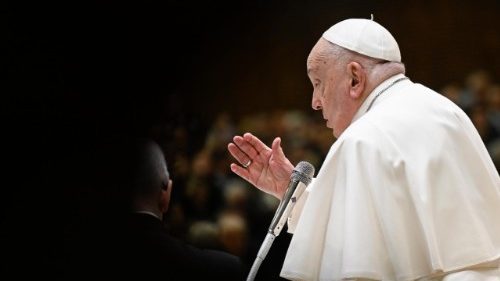
Pope Francis Improves and Prays for Myanmar Earthquake Victims
Exaudi Staff
28 March, 2025
1 min
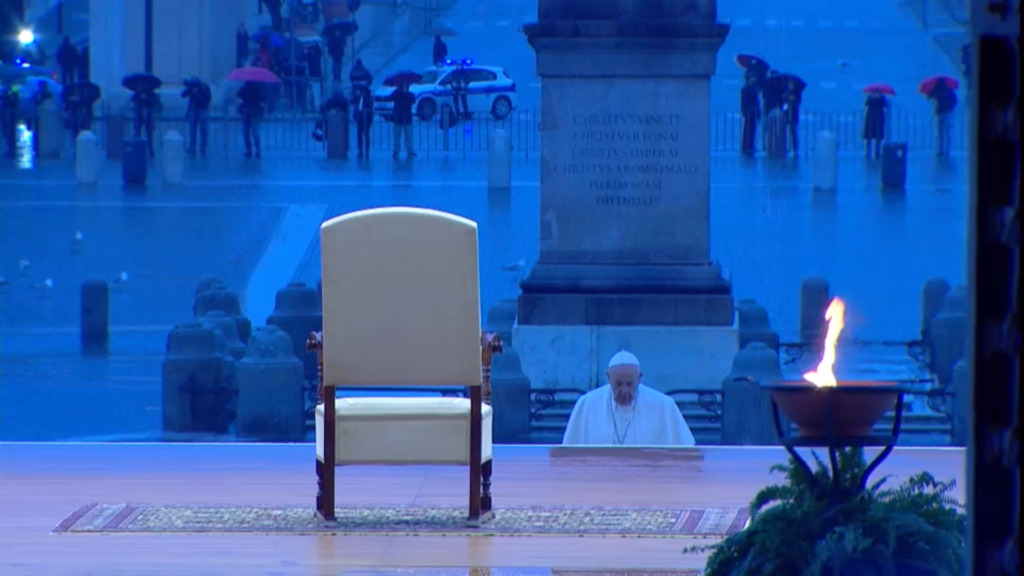
Five Years After Statio Orbis: Hope in the Midst of the Storm
Exaudi Staff
27 March, 2025
2 min
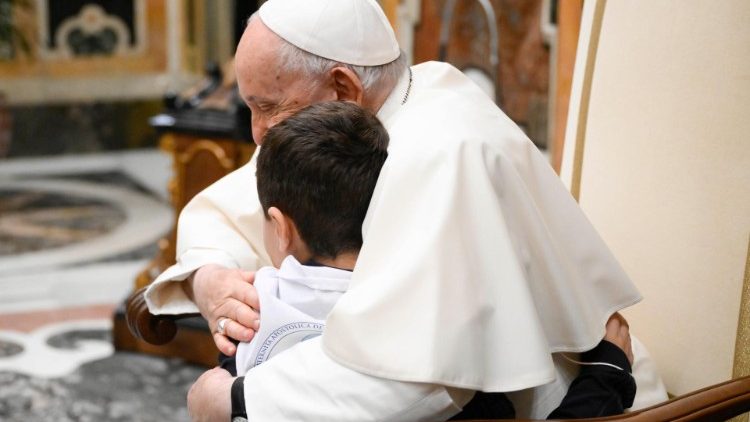
The Pope: May every child find a safe environment in the ecclesial community
Exaudi Staff
26 March, 2025
2 min
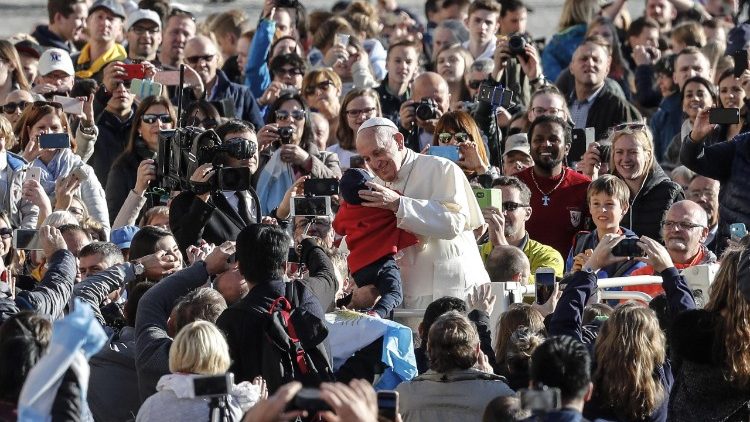
“God is mercy and always awaits us!”
Exaudi Staff
26 March, 2025
3 min
 (EN)
(EN)
 (ES)
(ES)
 (IT)
(IT)

